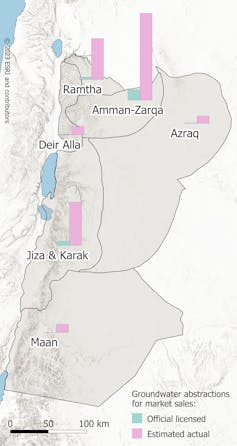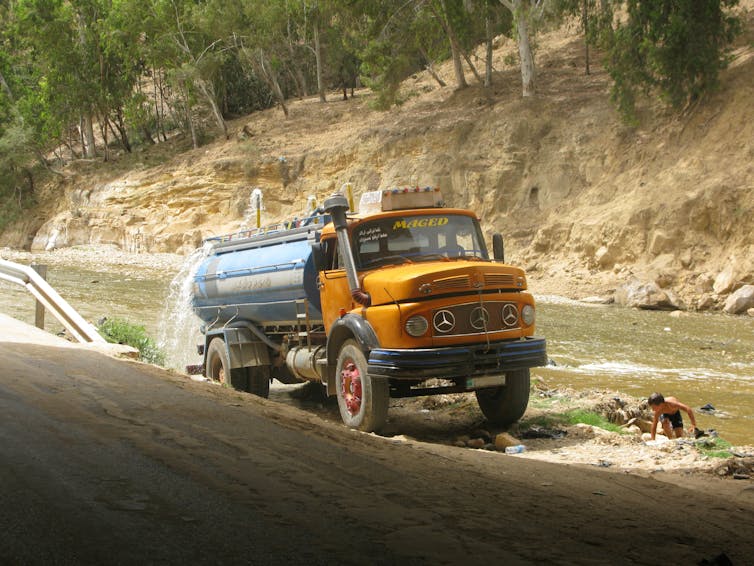Green water tankers are a common sight in Jordanian cities. The average Jordanian has running water for only a day and a half per week. When the taps run dry, residents and business owners call to order water to be refilled in rooftop or underground storage tanks.
But these trucks aren’t usually dispatched by local water utilities. Instead, they’re run by private operators licensed to sell drinking water, and increasingly, unlicensed operators who source water from private wells. This illustrates the rise of illicit water markets in the Middle East as the climate crisis makes droughts more severe and frequent.
When governments struggle to provide enough water
Roadside water supply is becoming increasingly important in large cities around the world. In some parts of the world, urban water networks are deteriorating and one billion people already face frequent interruptions to public water supply. This has led to a proliferation of informal water markets: in many water-scarce countries, truck drivers, well owners, or both, operate without a license to avoid fines and try to hide their activities. Whether these markets reduce or exacerbate water stress is a question that research has yet to answer.
This is because the nature of illegal markets – they operate clandestinely – makes them difficult to analyze. But our team at FUSE cleverly combined models developed by economists and hydrologists to shed light on illegal water markets in Jordan, the fifth most water-scarce country in the world. To conserve scarce water resources, Jordan began implementing routine piped water shutdowns in 1987. Since then, Jordanians’ average hours of use of public water have fallen from 7 days a week to 1.5 days.

Heinrich Sosmann/FUSE Project
Trucked water is up to 23 times more expensive
Our research shows that tankers play a much larger role in Jordan’s water supply than previously thought: 1 in every 6-7 litres of water in the country is transported by road, indicating that Jordanian cities are already severely affected by widespread water scarcity.
Our research found that more than half of the water used by businesses is currently delivered by tanker truck, including the majority of water used in hotels, shops and restaurants.
Water trucks also serve as a vital lifeline for households facing water scarcity. Many Jordanians use rooftop water tanks to compensate for periodic piped water outages. But access to public water is unequal; some areas receive just six hours of running water per week. When tanks run dry or the water supply is cut off, households turn to water trucks to fill the gaps.
This lifeline is very costly: households pay up to 23 times more for tankered water than for tap water, primarily due to transportation costs. Tankers travel an average of 29 kilometres to buy water from rural wells and then deliver it. Delivering water by road is therefore much more energy intensive and expensive than tap water supply. We estimate that transportation alone requires an average of 18 kilowatt-hours of energy per cubic metre of water sold, which is 3-6 times more energy than desalination, which is itself an energy-intensive process and causes additional carbon emissions.
Most of the tanker water sold in Jordan is extracted illegally. The map below shows that the amount of water pumped from Jordan’s aquifers for delivery in tankers is 10 times the amount allowed under well licences.

Our Research
The illegal nature of such pumping can hinder enforcement of groundwater conservation rules. Monitoring many widely scattered wells is difficult, and interviews conducted in 2015 revealed numerous cases of landowners threatening government officials. This is particularly problematic because Jordan’s groundwater levels are falling rapidly. The total tanker volumes of water sold annually represent 34 percent of groundwater pumped beyond sustainable yields, exacerbating resource depletion.
Increasing dependency
In the coming years, Jordanian households and businesses are expected to become significantly more reliant on water. Jordan’s population continues to grow rapidly while water resources dwindle. Jordan’s unstable regional environment exacerbates water scarcity and hinders the delivery of promising solution projects, such as the long-planned desalination of the Red Sea.
Jordan’s population is projected to double by 2050. During the same period, the country’s groundwater levels are expected to fall by about one meter per year and surface water resources are expected to decline by 20 percent. This will make it increasingly difficult for water utilities to provide enough water for everyone.
As a result, unless urban water supplies improve, household dependency on water supply will increase 2.6-fold by the middle of the century. Total water market turnover will increase by more than 50%, putting further pressure on the country’s groundwater resources.
Despite the expanding role of water markets, many households are at risk of losing their trucked water supply. Currently, almost all households that receive less than 40 litres of piped water per person per day buy trucked water. Water prices are projected to rise by one-third by 2050 due to falling water tables and longer transport distances. These rising costs mean that only two-thirds of water-scarce households can afford to pay for water.

Julian Arrow, Jordan Water Project, Provided by author (not to be reused)
Securing Access
Jordan is currently trying to re-control unregulated tanker water abstraction by closing illegal wells. This approach has been successful in reducing unauthorized withdrawals from irrigation wells. We argue that applying this policy to tanker wells would jeopardize household access to water unless fair and reliable public water access is ensured for all.
Tanker water supply is not an ideal solution to Jordanians’ water needs. Delivering the majority of water to businesses by road results in excess discharge. Mitigating uncontrolled groundwater extraction is a sensible policy goal. But closing illegal tanker wells will not reduce unmet urban water demand. Rather, the policy may unintentionally prevent households from accessing a critical water source.
As a long-term goal, Jordan should aim to complement its investments in expanding water supply with improvements to urban water networks, which could address urban water scarcity and unequal access to water that are the root causes of the emergence of water markets in Jordan. However, a recent study of large-scale investments to improve urban water supplies in Jordan found that effectively extending the duration of water pipes is difficult to achieve.
Until equitable and reliable access to piped water can be ensured, legalizing household tanker water supply may be a promising path to reduce uncontrolled groundwater abstraction while protecting access to essential water.
Problems like deteriorating urban water infrastructure, supply interruptions, and informal or illegal water markets are not unique to Jordan. Lebanon recently saw its public water supply decrease from 49 to 22 hours per week, increasing the percentage of the population relying on water tankers from 26% to 44%. Dry countries around the world face similar challenges. Jordan can lead by example by adopting policies that balance household access to water with sustainable groundwater management.

